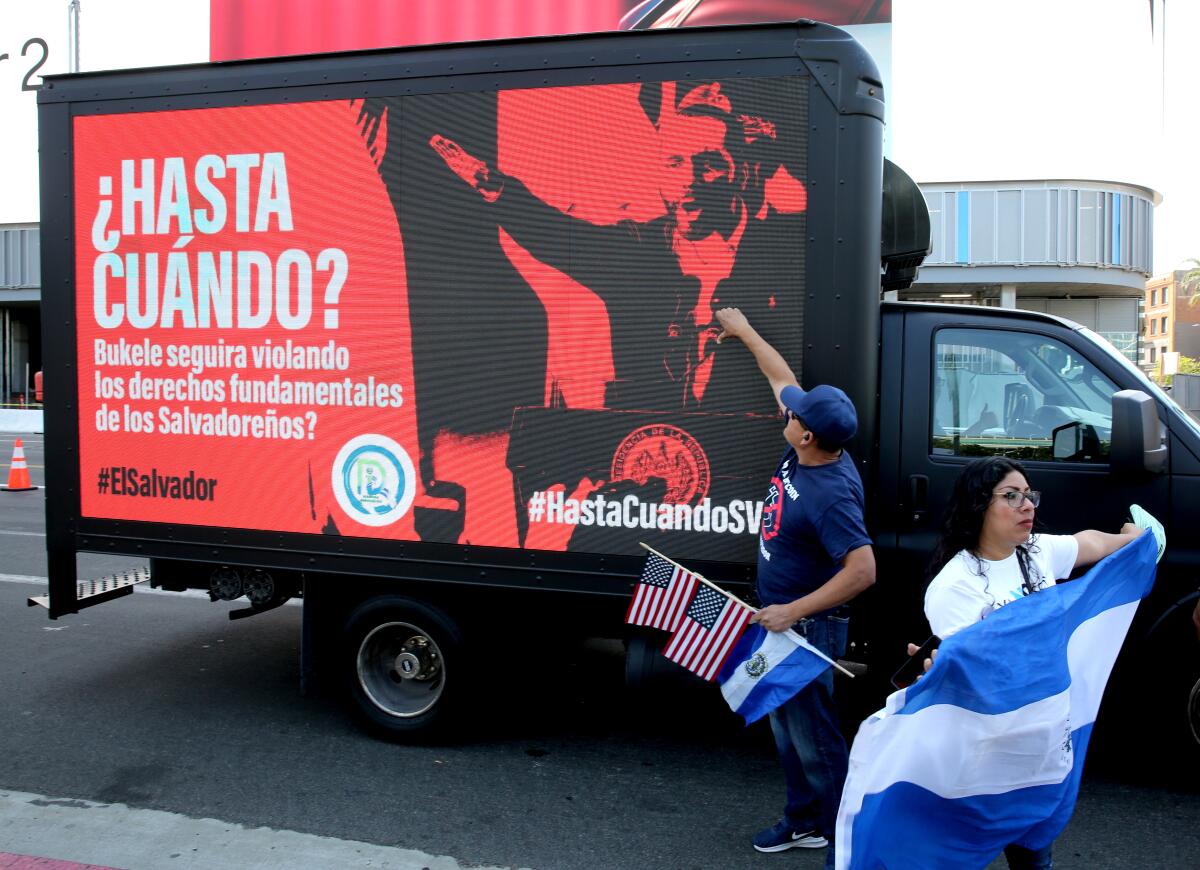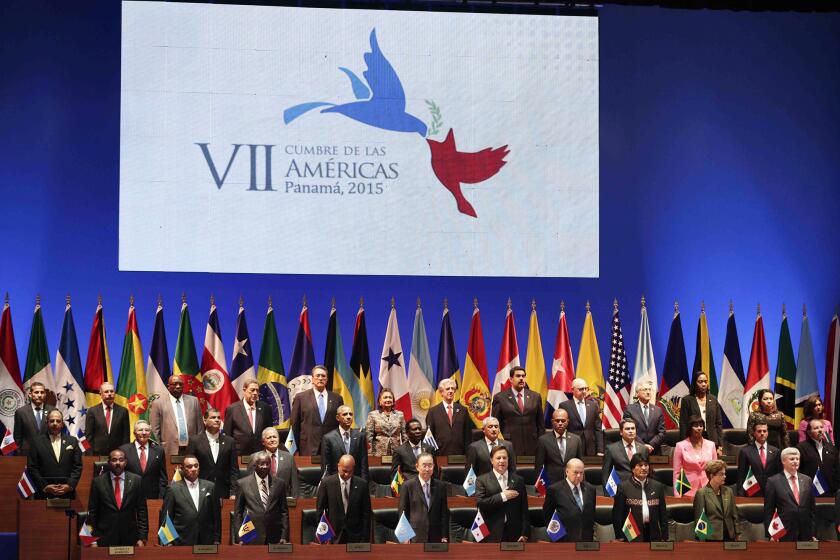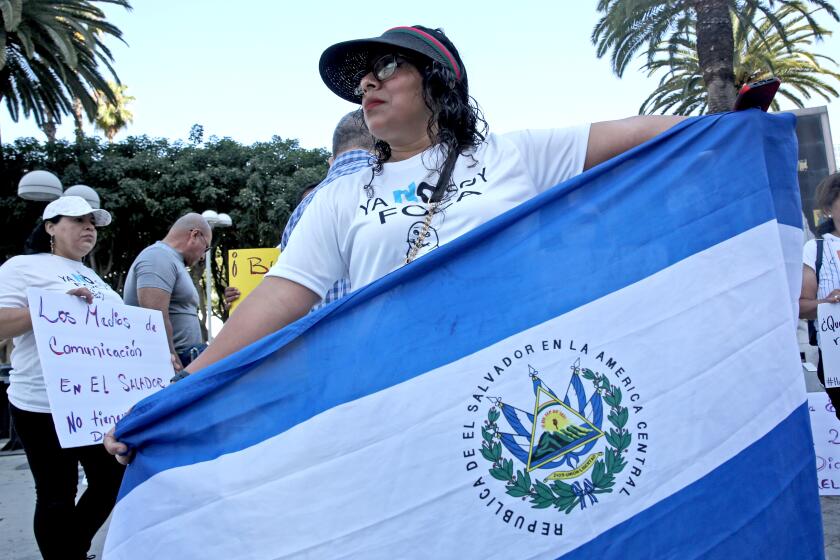Summit of the Americas hobbles to its opening as Mexico’s president declines to attend

As the high-profile Summit of the Americas got underway Monday in Los Angeles, with presidents and prime ministers from throughout the Western Hemisphere expected to attend, confusion continued to surround the agenda, what President Biden hopes to achieve and whether U.S.-Latin American relations will be better or worse as a result.
Even veteran Latin American specialists who have attended several of the regional conferences over the past three decades were exasperated, noting that the Biden administration only belatedly turned to the summit and potential agenda, along with its opportunity for progress and brighter relations in the hemisphere.
Some suggested the summit was so behind the ball in planning that it would have been better to cancel than to conduct the conference in a half-baked way.
“The problems with the summit can also be attributed to the sorry state of U.S. politics and the region,” said Michael Shifter, past president of the Inter-American Dialogue think tank in Washington.
Like other experts, Shifter believes Biden has not acted on his stated intention to deepen ties with Latin America.
“A highly fragmented and deeply troubled Latin America has not made [Biden’s] task easier,” Shifter said.
The high-profile conference takes place every three to four years and is expected to address issues such as immigration, climate and the pandemic.
The summit’s opening day was overshadowed by some major no-shows.
After weeks of coy, maybe-maybe-not flirtation with attending the conference, Mexican President Andrés Manuel López Obrador, arguably the most important Latin American leader on the guest list, finally announced Monday morning that he was staying home.
López Obrador was protesting the Biden administration‘s decision to exclude Cuba, Nicaragua and Venezuela, and others followed suit: Honduras, the administration’s closest ally in Central America, sent a lower-level delegation, Uruguay’s president said he had contracted COVID-19, and Bolivia also declined to attend.
After a steady stream of lobbying from Biden envoys, including former U.S. Sen. Chris Dodd (D-Conn.), López Obrador said he would send his foreign minister, Marcelo Ebrard.
“There cannot be a Summit of the Americas if all countries of the Americas cannot attend,” López Obrador said at his daily press conference in Mexico City. “This is to continue the old interventionist policies, of lack of respect for nations and their people.”
Deflecting a major blow to its ability to convene the region’s leaders, Biden administration officials sought to downplay the absence of López Obrador. White House Press Secretary Karine Jean-Pierre insisted that “dictators” should not be invited to the summit, defending the exclusion of Cuba, Nicaragua and Venezuela, while saying that the Mexican delegation, even without its president, would make “significant contributions” to the summit and its goals.
“We had a disagreement with this particular problem,” said a senior administration official, referring to the Mexican president’s absence while briefing reporters Monday after a significant delay before the summit’s start.
“We feel very confident with the approach we are taking [to the summit],” the official added.
At the gathering of the hemisphere’s leaders in Los Angeles, Central Americans express disagreement with the politics of their homelands with flags, posters and chants.
Despite López Obrador’s snub, Jean-Pierre said Biden would host his Mexican counterpart at the White House in July for a bilateral visit, giving them an “opportunity to carry the work forward for the summit.”
Brett Bruen, who served in the Obama White House as director of global engagement and is a frequent Biden critic, called the summit “an unmitigated disaster for American diplomacy in our own hemisphere.”
“The fact that we could not figure out the most basic things like who is coming, what are the major deliverables to be announced, is a national embarrassment,” he said, noting that the U.S. gets to host the event only every couple of decades.
Bruen said the scramble over planning reinforces a long-held impression that the region is not a priority, with China and Russia taking note of how we manage neighborly relations.
Still, the White House continued to fend off questions about how the U.S. planned to make progress on immigration discussions given Mexico’s absence from the summit along with two of the three “northern triangle” Central America countries.
The senior administration official, who briefed reporters on condition of anonymity, said Mexico has been a “full participant” in the migration declaration, which is expected to be announced at the summit later this week.
“We expect most, if not all of the countries that are significantly impacted by the migration crisis to be engaged on that topic with the summit, whether they’re represented by a head of state or not,” the official said.
The first Summit of the Americas was held in Miami in 1994, and this year’s event in Los Angeles marks its first return to the United States.
After weeks of requests, U.S. officials on Monday released a roster of the attendees of the conference. There will be 68 delegations at the event but only 23 heads of state, or about two-thirds of the region’s leaders, administration officials said.
Several summit events started Monday, including exhibitions with dissident Cuban artists and interviews with mayors from the region. Biden won’t open the formal session with the other world leaders until Thursday.
Biden and First Lady Jill Biden will host a gala dinner for the visiting heads of state Thursday night at the Getty Villa in Pacific Palisades, and meetings continue the following day. Issues to be addressed include immigration, trade and climate.
Though López Obrador’s absence underscored the question of whether any meaningful progress could be made on regional issues, some experts cautioned it shouldn’t obscure the summit’s potential.
“The U.S. should not see the summit as U.S.-centric in terms of the agenda, but neither should Latin American nations come expecting that the U.S. will or should set the tone of it,” said Diego Abente Brun, director of Latin American and Hemispheric Studies at the George Washington University.
He said Biden still has time to reset U.S.-Latin American relations and Latin American countries still have an opportunity to have their voices heard.
“Agreements and disagreements should be brought to the table, and hopefully a common agenda and, above all, commitment emerge from it.”
Times staff writer Eli Stokols contributed from Washington.
More to Read
Get the L.A. Times Politics newsletter
Deeply reported insights into legislation, politics and policy from Sacramento, Washington and beyond. In your inbox three times per week.
You may occasionally receive promotional content from the Los Angeles Times.














